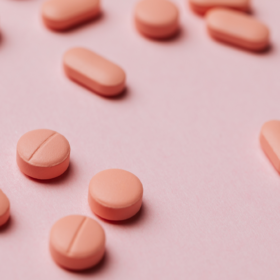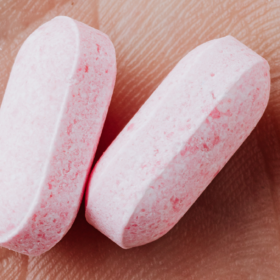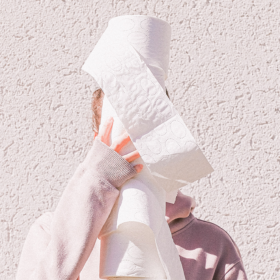
UTIs when pregnant
In this article
What's the lowdown?
Both irritatingly common and irritating to suffer from – UTIs have an increased prevalence during pregnancy
UTIs in pregnancy need to be treated early and usually with antibiotics to prevent complications
D-mannose is one treatment option that has shown increasingly promising results to manage UTI’s although at present in the UK is only recommended for those who aren’t pregnant
Get D-mannose on Amazon (affiliate link!)
Urinary Tract Infections (UTIs) During Pregnancy
Pop to the loo and there it is…the dreaded stinging burn like a thousand bees are traversing your urethra. Or that constant need to wee, over and over and OVER again. The most common symptoms of a urinary tract infection (UTI). Stats vary but UTIs are said to happen to at least ⅓ of women throughout their lifetime. And, the even worse part is that after having one UTI, the chance of having a recurrence within the following year is 50%.
The urinary tract changes during pregnancy (think decreased bladder capacity and dilated urethra), alongside hormonal changes, are why pregnant people have a higher risk of getting a UTI. In fact, a UTI is the most common bacterial infection experienced during pregnancy.
UTI Symptoms When Pregnant
UTIs tend to manifest with the same set of uncomfortable symptoms whether you’re pregnant or not. This is due to the bacteria that usually resides in the gut being present in the vagina and urethral areas. Classic UTI symptoms include an urge to wee more frequently (often with a sense of urgency), pain upon urination and abdominal pain. Other symptoms can be a change of urine colour and an inability to completely empty the bladder.
It is really important to keep check of UTIs in pregnancy because if left untreated, they can cause premature labour and severe infection like pyelonephritis (where infection spreads to the kidneys). During pregnancy, to avoid any complications affecting both you and the unborn baby, it is key that UTIs are addressed promptly to prevent the infection from the lower tract moving to the kidneys. This is one of the reasons a midwife will ask for urine samples at every visit. Thankfully, UTIs are very treatable.
Treating a UTI Whilst Pregnant Without Antibiotics
There are a range of non-antibiotic treatment options for UTIs (including recurrent infections) during pregnancy. Some treatments require further research but show promise and indeed a combination of a few treatment types could be a more beneficial approach.
However, if you exhibit UTI symptoms during pregnancy, it is super important that you contact your healthcare provider before buying any over the counter treatments or attempting to self-manage. They will talk through your symptoms and may conduct a urine test to confirm if you do indeed have a UTI, and whether you need antibiotics.
What is D-mannose?
In recent years D-mannose has been gathering attention in popular media as a treatment for preventing UTIs and managing symptoms. D-mannose is a monosaccharide found naturally in fruits such as apples and oranges, as well as some vegetables including broccoli. It is seen to be effective in treating UTIs as it prevents e.coli (one of the major bacteria types that causes UTIs) from sticking to the cells in the urinary tract and causing infection. One study looked at the impact of D-Mannose versus prophylactic antibiotics. Compared to the control group (who received no drug or active substance), D-Mannose reduced the recurrence of UTI. Not only this, but there was no statistically significant difference between D-mannose and the antibiotic. Another recent study found that after 3 days, symptom relief from D-mannose was comparable to that of antibiotics. If such promising results have tempted you to try D-mannose out, order it from The Lowdown!
Is D-mannose safe during pregnancy?
In the UK, the recommendation for using D-mannose is only for those who aren’t pregnant. Seek medical advice if you are pregnant, or think you may be pregnant, and think you have symptoms of a UTI. This is to avoid delay in accessing antibiotic treatment when needed due to complications on the pregnancy of UTIs
Have a discussion with your healthcare provider about D-mannose use in pregnancy as it might be helpful to prevent UTIs, especially after sex, or if you are prone to getting UTIs. The research available concludes that D-mannose has been shown to be safe and effective throughout all stages of pregnancy. However, before deciding to take any treatment it is important to have a chat with your GP so that you can make a well-informed decision.
It is also worth noting that blood glucose balance can be disrupted by D-mannose supplementation. The same applies if you have diabetes, so this is another consideration to be mindful of.
Other UTI Treatments During Pregnancy
Cranberry
Is there any logic to this classic UTI treatment? Research varies wildly on the effectiveness of cranberry for treating UTIs, with some sources suggesting that cranberry can reduce uncomfortable symptoms whilst others showing no statistically significant results at all. The thinking behind cranberry juices or tablets as treatment is that compounds within them prevent bacteria (particularly e.coli) from sticking to the cells of the urinary tract.
Vitamin C
Some research shows an association of decreased Vitamin C with increased risk of UTIs. Supplementing vitamin C in pregnant women reduced UTI recurrence rates after 3 months in a study of 110 pregnant women. However, more studies are required to show conclusive evidence!
Probiotics
Probiotics are safe in pregnancy and have been touted as an encouraging preventive measure, which could be useful for those who suffer from recurrent UTIs. They’re said to be of potential benefit as they counteract the colonisation of ‘bad’ UTI causing bacteria, with lactobacilli said to be a particularly effective probiotic. Further studies need to be conducted, but the current results are promising in administering probiotics in the prevention of recurrent UTIs, plus there is a good safety profile from the trials that have been carried out.
Lifestyle factors
Online research suggests various lifestyle interventions that are said to minimise the risk of UTIs. However, most of these have been explored in non-pregnant populations. One review paper concluded that preventative hygiene behaviour, such as washing after sex might be helpful to prevent UTIs.
What to do if UTI symptoms persist or get worse
It’s important to contact your healthcare team if you have UTI symptoms during pregnancy. Antibiotic treatment should be started quickly to prevent complications affecting the pregnancy and baby. If your symptoms do not improve with treatment, you start to feel more unwell, or develop new symptoms, contact your GP or hospital maternity unit. The pregnancy charity, Tommy’s, has a helpful pregnancy symptom checker if you are unsure of what to do.

Our medical review process
This article has been medically reviewed for factual and up to date information by a Lowdown doctor.




